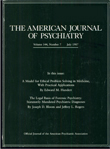Obsessive-Compulsive Symptoms in Schizophrenia
TO THE EDITOR: When does the presence of symptoms warrant a diagnosis? This is an important question raised by Jane L. Eisen, M.D., and colleagues (1). Obsessive-compulsive symptoms occur in schizophrenia, as do depressive symptoms, manic symptoms, and phobic symptoms among others. The emergence of obsessive-compulsive symptoms after infections and other processes that may impinge on brain function makes it reasonable to hypothesize that the same could be the case with schizophrenia. Identification of obsessive-compulsive symptoms in schizophrenia allows treatment to be modified accordingly. However, we need to address the implications of making a second diagnosis, establishing obsessive-compulsive disorder (OCD) as a comorbid condition rather than considering the symptoms as associated with schizophrenia.
DSM-III-R addressed this issue through the concept of diagnostic hierarchies. Relevant to this article, it stated: “When a more pervasive disorder, such as Schizophrenia, commonly has associated symptoms that are defining symptoms of a less pervasive disorder.only the more pervasive disorder is diagnosed.”
It would be conceptually more sound to have an obsessive-compulsive symptom modifier to add to the schizophrenia diagnosis than have a separate diagnosis of OCD. Obsessive-compulsive behavior may represent a final common pathway for disorders with multiple etiologies, and for that reason splitting off this symptom complex when it is associated with a pervasive disorder may be unwise. Parsimony in diagnosis has its logic.
1. Eisen JL, Beer DA, Pato MT, Venditto TA, Rasmussen SA: Obsessive-compulsive disorder in patients with schizophrenia or schizoaffective disorder. Am J Psychiatry 1997; 154:271–273Link, Google Scholar



